#Lishan laomu
Text
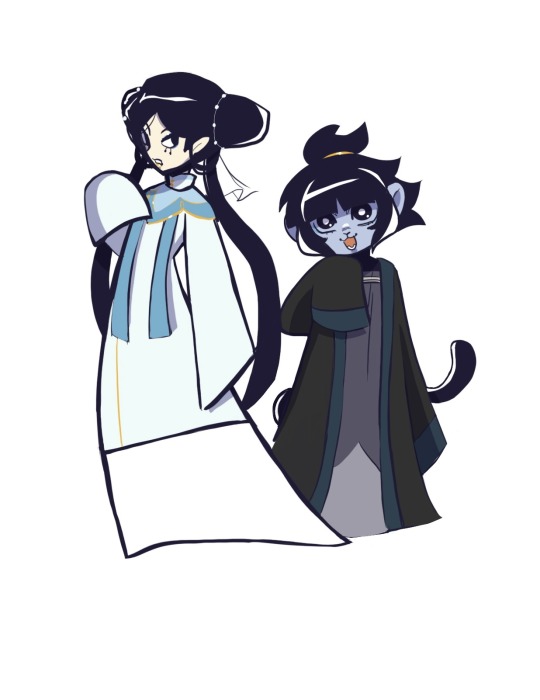
Finally made a design I liked for Sun Wukong’s sisters , Lishan Laomu (離山老母, Venerable Mother of Mount Li) and Wuzhiqi Shengmu (巫支祇聖母, Holy Mother Wuzhiqi) after reading this article by @journeytothewestresearch
#lmk oc#lmk oc art#jttw#journey to the west#lego monkie kid oc#monkie kid oc#Lishan laomu#Wuzhiqi shengmu#my artwork#:)
24 notes
·
View notes
Text
I been quiet for awhile, but I know the white masked monkey was possibly inspiration for him, but in the line of o wukong having four siblings, what if Macaque was really the youngest and forgotten or barley mentioned sibling out of the five. I'm on team Macaque's a bitch, but to have siblings be gods, rulers of their own kingdoms, masters of their craft, well respected, and celestial beings that no one would fuck with I will be throwing up and crying, cause that is prime villain origin story.
#sun wukong#six eared macaque#Lishan Laomu#wuzhiqi#to be fair their older brother also also don't have a name#but he actually has a title as an sage and then the white masked monkey is literally just the third son#very much they don't need to know my name to know who I am vs you are literally an afterthrough😭#we can both acknowledge that macaque is fucked beyond sight and that he went through alot of trauma#I can walk and chee bubblegum
19 notes
·
View notes
Note
omg and in the play before the novel wukong had an older sister called holy mother wuzhiqi!
She was! Another good reason to remember the prototype Wukong (Xingzhe) was that he had SIBLINGS.
I always thought how cool it would have been if the celestial primates were inspired by them but considering that Xingzhe had four siblings making them five altogether would be one too many. And that there only seem to be 3 Monkey Sages and Wukong being one of them, making them 1 monkey too few.
The number four really never gets touched... damn.

But if there was a way to combine the lore together it could be that three of his four siblings are actually monkeys (Wuzhiqi Shengmu, Qitian Dasheng, and Shuashua Sanlang) while his first sister is more human in her description in other sources (Lishan Laomu).
If I would have to somehow combine Xingzhe's lore with the Spiritual Primates then I think I would do it something like this.
Great Sage Equaling Heaven (Qitian Dasheng) 齊天大聖 - Changed to Sun Wukong
Great Sage Reaching Heaven (Tongtian Dasheng) 通天大聖, - Six Eared Macaque getting Xinghe's original title, maybe even hinting that he was the turbulent Sun Xingzhe prototype.
Playful Third (?) (Shuashua Sanlang) 耍耍三郎 - Red Bottom Horse Monkey
Holy Mother Wuzhiqi 巫支祇聖母 Wuzhiqi Shengmu- Long Armed Gibbon
I would think that maybe switching Xingzhe's original title with the 齊天大聖 would just highlight how different the Yuan Sun Xingshe and the Ming Sun Wukong were written. Giving a little meta-outlook that perhaps the Yuan tale was inspired by the Six-Eared Macaque all along which for an adaption I would find SUCH a cool reference.
There is a lot that could go into this kind of adaption, especially since there are still other monkey gods that are known about today that could be tied into giving the Primordial Primates some more background and lore, connecting them that they were all once monkeys of legend but eventually lost their prestige through time as their eldest brother overtook the spotlight.
It would just be awesome to give the Primates just more attention in that they had just vague backgrounds I get directors would want to just have fun with them, but having real ties to past Xiyouji adaptions just... would be so meaningful really.
Though another interesting tie-in (and might be more of a stretch) could be giving the other three celestial primates with the Three Monkey Sages.
That kind of adaption could be suggesting that the other three Sages were sticking together and making their own name until one of them gave in and wanted to imitate Sun Wukong.
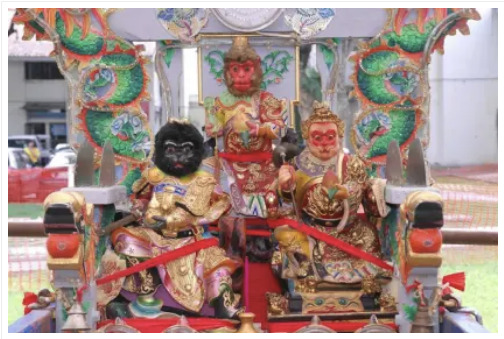
Cinnabar Cloud Great Sage (DanXia DaSheng) 丹霞大圣 - The Red Face Monkey Sage - Six Earred Macaque
Great Sage Reaching Heaven (TongTian DaSheng) 通天大圣- The Black Face Monkey Sage - Long Armed Gibbon
Playful Third ShuaShua SanLang (耍耍三郎) - The White Face Monkey Sage - Red Bottom Horse Monkey
This is more based on the looks and the particular reason that I think that Six Ears being the Cinnabar Cloud Great Sage is better here since the Cinnabar Cloud Great Sage actually DID steal Wukong's identity in the Pacification of the Demons of Linshui 臨水平妖傳. Also, the Black Faced Monkey Sage looks more like a Gibbon and the White Face Monkey Sage looks more like a Baboon to me.
This has made me go on such a tangent but this is all to say that there could be SO MUCH MORE LORE in adaptions given to the primordial primate with how many AWESOME legends there are out there.
#anonymous#anon#jttw#anon ask#journey to the west#xiyouji#celestial primates#celestial monkeys#primordial primates#spiritual monkeys#so much can be done#sun xingzhe#sun wukong#great sage equalling heaven#great sage equal to heaven#wuzhiqi#wu zhiqi#red bottom horse monkey#red bottom baboon#red bottom mandrill#long armed gibbon#bare armed gibbon#six eared macaque#ask
66 notes
·
View notes
Text
Princess Iron Fan LMK and More.....
Princess Iron fan does not have a lot of information about her in the LMK universe SOOOOoooo I went digging and wanted to share what I found.

LMK:
Princess Iron Fan is a former celestial, after fighting the brotherhood and their rebellion against heaven she fell in love and became the wife of the Demon Bull King, and the mother of Red Son. She wields a giant fan that is able to create tornadoes.

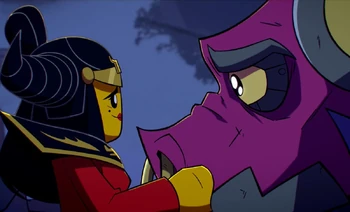
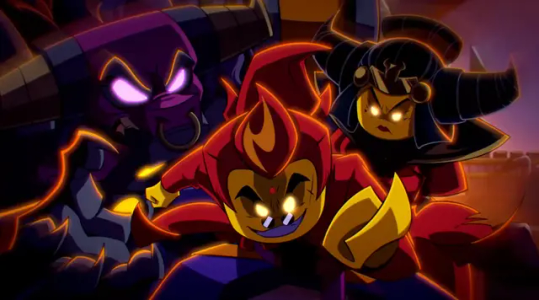
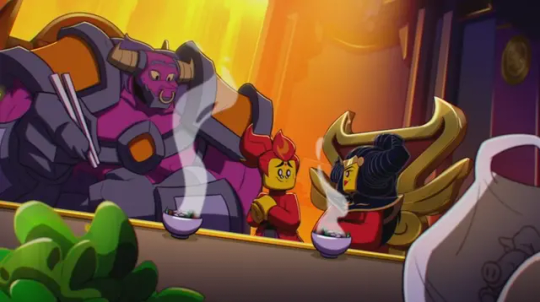

Other Legend's:
Some legends depicted her as a Taoist goddess and the ancestor of the wind gods who was entrusted by the heavenly court, and all the wind gods were under her jurisdiction.
She is said to be the mentor of Meng Po, the goddess of forgetfulness.
In Yuan zaju tradition, she is the sister of Lishan Laomu and was originally a friend of the Queen Mother of the West, Pilanpo and belonged to Taoism. She once had a dispute with the Queen Mother of the West because the Queen Mother of the West brought her own wine. As a result, she rose up against the scene and turned against the heaven.
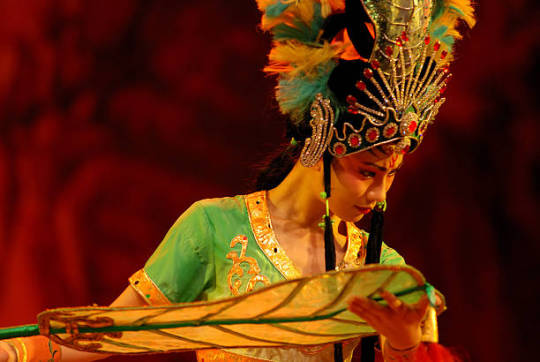
In Journey of the West:
She is demoness married to Demon Bull King and when we meet her she is mad at Bull King for cheating on her with Princess Jade Face.
She possesses the magical Banana Leaf Fan. The fan, made from banana leaves 1 of 5 sacred treasures of Laozi. It can create giant whirlwinds that are capable of extinguishing the fire on the Flaming Mountains. Princess Iron Fan used this ability by fanning only once each time, the fire would only be extinguished for a year before starting again.
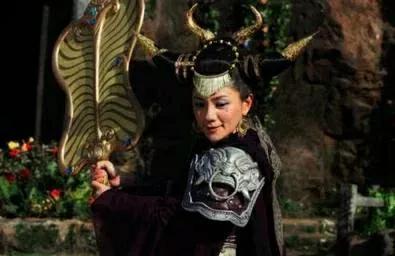
When Wukong and the pilgrims need to pass the mountain they go to Iron Fan and she turns them away. After a few tries and tricks and only getting fake fans, making the fire worse. The Jade Emperor sent his heavenly troops to help Sun Wukong defeat Bull Demon King and Princess Iron Fan for good, and she was forced to give them the real fan. After using the fan to extinguish the fire on the Flaming Mountain, Sun Wukong forgave the princess and returned the fan to her. The princess continued her spiritual practice and eventually achieved success.

In Journey of the South :
Princess Iron Fan is depicted as a goddess, the daughter of Yuhuan Shengmu and has a younger brother named Shan Cheng.
When Huaguang Dadi the protagonist of the novel stole the Golden Pagoda from Iron Fan's mother she disguised herself to seek revenge. In their first battle, she defeated him. Later, Huaguang after getting a Wind-Calming Pill he captures Princess Iron Fan and marries her. Due to the story of their marriage, Princess Iron Fan is worshipped alongside Huaguang Dadi in the Huaguang Great Emperor Temple [zh] in Fu'ao Village.

Fun Facts:
In the Dragon Ball series, Goku's Wife Chi Chi is based off of Iron Fan. Chi Chi's first appearance, her mission alongside Goku was to find the Bansho fan to put out the fire in her father's castle. Her father being the Ox King so in Dragon Ball Fan is the daughter to the Bull.

I find it funny that Iron Fan's adaptation is married to Wukong's adaptation.
#jttw#lego monkie kid#lmk#lmk princess iron fan#princess iron fan#dragon ball#son goku#chi chi#journey to the south#fan thoughts#demon bull king
41 notes
·
View notes
Note
Jiaozi is a character from the "journey to the west" of the yuan zaju dynasty, daughter of king huolun jinding and wife of sun wukong, the great sage of tongtian. Sun wukong once said, "I stole fairy clothes, fairy hats, fairy peaches and fairy wine in my heavenly palace. My wife will happily enjoy them." So jiaozi is not only sun wukong's wife also is the mother of his children. Jidu and luohou and daughter yuebei. The eclipses twins and the moon star comet
@maidenofthecloud hmmmm apologies if I'm missing something but as far as I knew "Jiaozi" is just a kind of dumpling (X_X). HOWEVER, this could very well just be due to my own ignorance and the fact that I've never encountered an English translation of the Zaju Xiyou Ji. If you have the link to one please share it!
As it is pretty much all my knowledge of that play comes from the scholar Hongmei Sun's overview of different versions of the the Monkey King throughout the centuries. Here's a few things she has to say on this earlier version of the westward journey:
"The six-part, twenty-four-act Zaju Xiyou ji is attributed to the fourteenth-century playwright Yang Jingxian, who lived during the late Yuan and early Ming periods. In the few hundred years between Shihua [an even earlier version] and Zaju, the story of ‘Journey to the West’ is not only more expanded, containing many of the stories that can be found later in Journey to the West, but the monkey figure in Zaju has grown into a character strikingly different from Hou Xingzhe [the monk's faithful companion in Shihua]. If Hou Xingzhe in Shihua is depicted as an advisor for Tripitaka, as respectable albeit mysterious deity, and a brave fighter, the monkey in Zaju is pictured as a rowdy clown, an untamed demon and ill-qualified Buddhist disciple.
The monkey’s name in Zaju now is almost the same as in the sixteenth-century fiction Journey to the West. He refers to himself as ‘Tongtian Dasheng’ (Great Sage Reaching Heaven), only one word’s difference from ‘Qitian Dasheng,’ the title Sun Wukong receives from the Taoist heaven in the sixteenth-century book. In some versions of the Monkey King story, including the Zaju, Qitian Dasheng and Tongtian Dasheng are brothers…
Although Tongtian Dasheng is the monkey’s title, in the drama everyone calls him ‘the monkey’ (husun), including Guanyin, even though she is the person who gave him the names Sun Wukong and Sun Xingzhe (Acolyte). When Guanyin presents Sun Xingzhe to Tripitaka as his disciple, she gives the monkey an iron fillet, a cassock, and a knife….Even with the headband’s control, Tongtian Dasheng’s behavior and language indicate that his mind remains that of an irreverent demon.
As in the zaju theater tradition, Sun Xingzhe introduces himself to the audience with a poem at his first appearance. Vaunting his celestial birth, his power, and the troubles he could create, in colloquial expression rather than elegant traditional terms as others’ opening poems, the monkey’s poem describes himself as a celebrated ape demon, referring to himself as the King of a Hundred Thousand Demons. In the following statement he introduces himself and his four siblings as his demon family: His elder brother Quitian Dasheng, a younger brother Shuashua Sanlang, and two sisters, Lishan Laomu and Wu Zhiqi Shengmu. This genealogy of the monkey shows that Sun Xingzhe in Zaju is already much more localized, settled into the local religious/cult culture. Unlike the monkey in other versions, this one has a wife, the abducted princess of the Country of the Golden Cauldron. He also proudly reports to the audience his famous misdeeds, which is also the reason that heaven is after him: he has stolen the Jade Emperor’s celestial wine, Laozi’s golden elixir, and the Queen of the West’s (Xichi Wangmu) peaches and fairy clothes. He also makes upfront ribald references about himself in this very first speech. The monkey’s demonic heart is indicated by his intention to eat Tripitaka immediately after Tripitaka rescues him from beneath the mountain. He never shows any seriousness about his business of pilgrimage, and his behavior does not improve during the journey. When the team arrives in India, he uses crude language in a conversation with an old lady about Buddhis ideas of the ‘heart.’”
---
@journeytothewestresearch also writes that in Zaju Xiyou Ji the princess is eventually freed from her forced marriage to this monkey by Heavenly King Li Jing (Li Nezha's father) and the Bodhisattva Guanyin. Here Sun Xingzhe/Sun Wukong definitely bares more similarity to magically powerful and sexually violent monkeys in other stories from Chinese folklore! And that remains true even though the quote you provided makes it sound like he wants the princess to enjoy nice things.
So given these literary and historical circumstances, especially with Jidu, Louhou, and Yuebei Xing not appearing until the 17th century Journey to the South, it might be a stretch to say that the princess of the Country of the Golden Cauldron is a likely candidate to be their mom. This is especially true since as far as I'm aware there's no mention of Sun Xingzhe and the princess having any kids, or even of her being pregnant...ON THE OTHER HAND, it must be acknowledged that she might also be the best candidate given that no mom is mentioned in Journey to the South and that there is a historical precedent for her being Sun Wukong/Sun Xingzhe's wife for awhile. If that narrative thread is followed then it might mean Jidu, Luohou, and Yuebei Xing have more than one similarity to the children of the Yellow Robe Demon, who also kidnapped a princess and had two children with her. In that situation I'd actually hope that she isn't their mom, given that that would make Sun Wukong a rapist and them the product of a forced marriage. ON THE OTHER OTHER HAND, given that the Monkey King's characterization and many aspects of his history from Journey to the West and Journey to the South (as far as I know lmao) is so different from Sun Xingzhe's in Zaju Xiyou Ji , and that all of this comes from folkloric roots in which stories are very different from region to region and even one year to the next, I could see there being an argument made for bringing her into the more recent continuations of Xiyouji as Sun Wukong's wife and the mother of his children while the rapey aspect of the earlier version of their relationship is dropped for something more loving or at least consensual. So even with my ignorance on what precisely happens in Zaju Xiyou Ji and Journey to the South, it seems like as with Xiyouji itself there's a lot you could potentially do with "the princess of the Country of the Golden Cauldron is Jidu, Louhou, and Yuebei Xing's mother" idea, from the sweet and loving to the absolute grimdarkest context.
#xiyouji#journey to the west#jttw#zaju xiyou ji#journey to the south#sun wukong#monkey king#princess of the country of the golden cauldron#jidu#louhou#yuebei xing
22 notes
·
View notes
Text
The Evolution of Sun Wukong's Title
1. Great Sage Steel Muscles and Iron Bones (Gangjin tiegu dasheng, 鋼筋鐵骨大聖) - 13th-century "Kozanji version"
"Emperor T'ai Tsung later enfeoffed Monkey Pilgrim as 'Great Sage Steel Muscles and Iron Bones'" (Wivell, 1994, p. 1207). [1]
2. Great Sage Reaching Heaven (Tongtian dasheng, 通天大聖) - 15th-century Xiyouji zaju play
"We are five brothers and sisters: my elder sister is Lishan Laomu [離山老母, Venerable Mother of Mount Li], my second sister Wuzhiqi Shengmu [巫支祇聖母, Holy Mother Wuzhiqi]; my older brother is Qitian Dasheng [齊天大聖, Great Sage Equaling Heaven], I myself am Tongtian Dasheng [通天大聖, Great Sage Reaching Heaven], and my younger brother Shuashua Sanlang [耍耍三郎, Shuashua the Third Son]" (Dudbridge, 1970, p. 110).
3. Great Sage Equaling Heaven (Qitian dasheng, 齊天大聖) - 1592 edition of the novel
"…What is there to stop you from assuming the rank of the Great Sage, Equal to Heaven?" When the Monkey King heard these words, he could not conceal his delight, shouting repeatedly, "Bravo! Bravo!" "Make me a banner immediately." he ordered the four mighty commanders, "and inscribe on it in large letters, 'The Great Sage, Equal to Heaven.' Erect a pole to hang it on. From now on, address me only as the Great Sage, Equal to Heaven, and the title Great King will no longer be permitted. The Monster Kings of the various caves will also be informed so that it will be known to all" (Wu & Yu, 2012, p. 151).
Note:
1. The translation actually says "Bronze"; however, the original Chinese says "Steel" (see here).
Sources:
Dudbridge, G. (1970). The Hsi-yu Chi: A Study of Antecedents to the Sixteenth-Century Chinese Novel. Cambridge: Cambridge Univ. Press.
Wivell, C.S. (1994). The Story of How the Monk Tripitaka of the Great Country of T’ang Brought Back the Sūtras. In V. Mair (Ed.), The Columbia Anthology of Traditional Chinese Literature (pp. 1181-1207). New York: Columbia University Press.
Wu, C., & Yu, A. C. (2012). The Journey to the West (Vol. 1). Chicago: University of Chicago Press.
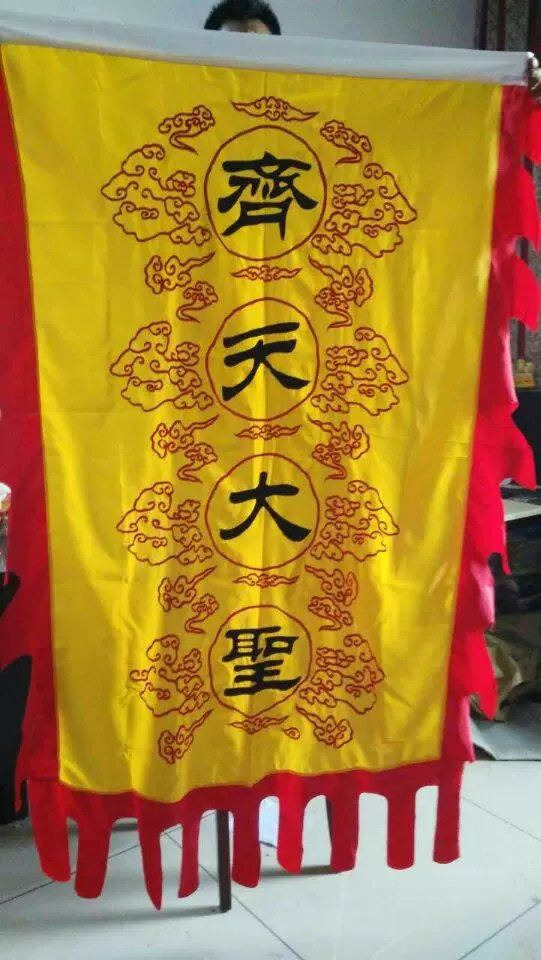
#Sun Wukong#Monkey King#Great Sage Equaling Heaven#Qitian dasheng#Journey to the West#JTTW#Lego Monkie Kid
54 notes
·
View notes
Note
Have you worked with any chinese spirits or deities before? Maybe Lishan Laomu?
I haven’t worked with any Chinese deity before but i’m working with Chinese dragons!
57 notes
·
View notes
Text
thinks about celestial pif...
thinking about how she used to be friends with the Queen Mother of the West in one form of Chinese Opera ; she belonged to Taoism, religiously speaking.
supposedly, she was a sister to a very popular mountain goddess named Lishan Laomu, and one of the reasons she left heaven was because she threw a party and the Queen Mother slighted her by bringing her own wine.
#☼ ◜ooc.◞#// thinks about lmk pif being the brotherhood's mole in the heavenly system...#// it couldve WORKED#// and wukong couldve been an even more awesome wingman#// by bringing her n dbk together#// or w/e
5 notes
·
View notes
Note
hey where did you hear Iron Fan came from heaven??? i dont think thats true
In Yuan zaju tradition, she is the sister of Lishan Laomu (Old Mother of the Li Mountain)[9] and was originally a friend of the Queen Mother of the West, Pilanpo and belonged to Taoism.[10] She once had a dispute with the Queen Mother of the West because the Queen Mother of the West brought her own wine. As a result, she rose up against the scene and turned against the heaven.[8]
What I found when I was doing research on her.
19 notes
·
View notes
Note
Hope this isn’t too odd of a question but is there like, a minor theme of the villains being like evil versions of certain gods/allies? Like, the most obvious is the Six Eared Macaque, who impersonated Sun Wukong, but there’s also Red Boy, who’s compared to Nezha in appearance and also uses a spear and fire, Lady Earth Flow, who called herself the Half Guanyin, and I heard that Princess Iron Fan had an origin of being a goddess before becoming a demon, and I heard that the Queen Mother of (1)

Well like I said before when it comes to the antagonists in Xiyouji... there can be many different types of interpretations that can be drawn from. But I don't think that there is a real 'evil versions' of deities going on from there.
Red Boy being a good example as he has a history in Buddhism before Xiyouji was made.
I think something that people forget or don't know is that Wu Cheng'en's version of Journey to the West, wasn't really the 'first' or rather is wasn't something that he created all from his own imagination. The story of Xuanzang's pilgrimage has been told many times at this point and there were many stray stories with different demons or challenges that were either for pure entertainment value or did have great allegorical meanings.
What gave Wu Cheng'en that edge that made 'his' version of the story was not only did he drawn from many of the most popular stories, interpretations, and took the most charming (or humane) aspects of the characters and was able to make a large, long decently cohesive story that people in either lower class or higher class can draw enjoyment from.
So that being said... taking EVERY allegorical possibility of each antagonist, with each demon having a tie to either Buddism, Daoism, or Chinese folklore, or even a mix of two or all three... is RESEARCH PAPER level kind of study and I am not qualified to answer in a tumble post ;_;
But that being I said I don't think Red Boy is just evil Nezha (who has his own lore and history) as when he turns into the Child of Wealth he becomes Shancai which has a rich history all on its own.

Red Boy takes greater inspiration from the Buddhist history of this disciple than of Li Nezha.

Lady Earth Flow another example only calls herself 'Half Gaunyin' because she stole precious Candles from vulture peak. There are a lot of demons in Xiyouji that show their power or clout rather by having a connection to Buddisht lore, like the Scorpion Queen claiming she was able to injure Tathāgata and that the Golden Wing Peng is his uncle because his mother the Peacock ate him and he escaped giving 'birth' to him and was promoted to his godmother hence the connection.
These connections are more about giving credibility to the antagonists' power and even giving more insight into perhaps where these stories or such are connected.
Princes Iron Fan being a Taoist Goddess is a thing but that happens moreso in the Yaun Dynasty in which is before Xiyouji was written and in zaju she is presented as a sister of Lishan Laomu (who funny is enough is ALSO the sister of Sun Xingzhe in Zaju Xiyou ji so that is interesting) but left heaven due to a dispute with the Queen Mother at a banquet. However, it looks like in Wu Cheng'en's Xiyouji I have seen her being described as a Rakshasa which is connected to Hindu lore. I do now know if the intended meaning was to erase the Taoist backstory she has but perhaps making this a lot like Red Boy in giving the character a new background for the sake of the narrative. Or perhaps it is to show how multiple different inspirations can be used to create a single character and that while it is not really a 'canon' it would have been realizing known who the character is at that point and would not cause much confusion.

As for the Queen Mother being a demon, I personally do not think that the version seen in Wu Cheng'en would have that connection due to the fact that the image of the Queen Mother was greatly changed by that point. Her interpretation in the Zhou dynasty where they give her the title of a goddess of death and later she is influenced by Taoism and is given further elements such as immorality and longevity. But even in that interpretation, she is an immortal, not a demon, and perhaps the re-writings of her lore make it so that when he was more integrated with Taoism she was given a different backstory as well. I cannot say for certain as this is more of a case of a change of legends that she had ties showing of being connected to being a feline/tiger demon that was later changed within her own legend.

However when it comes to a lot of antagonists in Xiyouji having heavenly backgrounds I think there is more discussion there, than trying to compare them to any other existing deities as the doppelganger trope isn't played that much.
There are about 4 fallen Celetials if we are not including Princess Iron Fan being Yellow Robed Demon, Golden Horned King, Silver Horned King, and Yellow Brows King and about 12 heavenly animals (I will not name them all) that have escaped heaven and each one gives their own varies of reasons from being personal gain or that they were ordered to just to be trails specifically for the pilgrims to overcome. Some wanted revenge, love, glory, or just for their own sake.
Personally, I think that having so many heavenly creatures fall from heaven to be demons was to show that both heaven and earth are not perfect and that even in the highest authority there are still cracks in the system that must be held accounted for. Bajie and Wujing being two big examples as they themselves were fallen celestial soldiers on earth as a punishment while other celestials saw it as a way of freedom and escaping their responsibilities. It makes an interesting argument of how the heaven's view of Yaoguai and their origin influence their judgment, Wukong being the only Yaogaui without a background tied to the heaven beyond being made of Yin and Yang but his fellow disciples once had stood there.
I think there is a lot to be said on how the treatment of Yaoguai changes when the antagonist is from a heavenly origin as they are rarely if never killed, rather being subdued and sent back to heaven for trial or just punishment. As much as Wukong does kill a lot of demons, he also sends a lot of them to court for their crimes which I do find to be an interesting take, especially with yaoguai that Wukong wishes to personally punish.
The relationship between heaven and yaoguai is something I think could really be delved into with how there almost seems to be double standards when it comes to how yaoguai are to be treated when they cultivate on their own verse if they eat humans to cultivate verse if 'cheat' by skipping their reincarnation cycle and going straight from animal to humanoid using heavenly objects. From there that almost distracts whether they are able to go back to their original forms to cultivate for their next life to be a human or if they are to be killed and try again in the next life.
But no matter what the case is, yaoguai is seen as both a punishment by the heavens but also seen as a chance for individuals to escape their current status and strive for their own goals, as selfish as they are.
Long story short.
It is that deep.
https://so03.tci-thaijo.org/index.php/jletters/article/download/251848/171700/942171
#sun wukong#queen mother#red boy#journey to the west#jttw#xiyouji#more allegories#anonymous#anon#anon ask#just a lot to unpack#lady earth flow#albino rat demon#princess iron fan#shancai#ask
20 notes
·
View notes
Text
Researching more and sun wukong's convoluted family tree and general relationships plot thickens.
Cause, why didn't anyone tell me in one version of a myth including princess iron, she was the sister of Lishan Laomu (or one of her many pupils in others), who is also the older sister of wukong in another telling of a journey to the west as well as her rebelling against the heaven, because the mother queen brought her own wine to her dinner party.
Adding, this to the fact they somewhat left off on ok terms in the book, why isn't isn't nobody doing them bonding over being about to say they kicked heaven's ass. Also couldn't pass up the chance to not have this meme opportunity.
DBK:

33 notes
·
View notes
Note
Did you know that wukong kidnapped the princess of the golden cauldron country and apparently forced her to be his wife, before she’s got saved by nezha and li jing in some play (not in the OG novel) dang who knew he’d be that crazy XD
Happy Sun Wukong Sunday anon, and I do indeed know this. That said, the difference between that proto-Sun Wukong (who goes by the name Sun Xingzhe) and the Monkey King we know and love are so different that they really seem like two completely different characters! The scholar Hongmei Sun provides a really interesting overview of how radically the monkey pilgrim who guards the monk Xuanzang on his journey changed over time, and includes a good summary of what a unserious and sex-obsessed yaoguai the monkey of the play you mention is. I'm including a selection of her words on the matter below (putting in behind a keep reading sign because gosh dern this monkey is crude:
-"The six-part, twenty-four-act Zaju Xiyou ji is attributed to the fourteenth-century playwright Yang Jingxian, who lived during the late Yuan and early Ming periods. In the few hundred years between Shihua and Zaju, the story of ‘Journey to the West’ is not only more expanded, containing many of the stories that can be found later in Journey to the West, but the monkey figure in Zaju has grown into a character strikingly different from Hou Xingzhe. If Hou Xingzhe in Shihua is depicted as an advisor for Tripitaka, as respectable albeit mysterious deity, and a brave fighter, the monkey in Zaju is pictured as a rowdy clown, an untamed demon and ill-qualified Buddhist disciple.
-"The monkey’s name in Zaju now is almost the same as in the sixteenth-century fiction Journey to the West. He refers to himself as ‘Tongtian Dasheng’ (Great Sage Reaching Heaven), only one word’s difference from ‘Qitian Dasheng,’ the title Sun Wukong receives from the Taoist heaven in the sixteenth-century book. In some versions of the Monkey King story, including the Zaju, Qitian Dasheng and Tongtian Dasheng are brothers…”
-“Although Tongtian Dasheng is the monkey’s title, in the drama everyone calls him ‘the monkey’ (husun), including Guanyin, even though she is the person who gave him the names Sun Wukong and Sun Xingzhe (Acolyte). When Guanyin presents Sun Xingzhe to Tripitaka as his disciple, she gives the monkey an iron fillet, a cassock, and a knife….Even with the headband’s control, Tongtian Dasheng’s behavior and language indicate that his mind remains that of an irreverent demon.
-As in the zaju theater tradition, Sun Xingzhe introduces himself to the audience with a poem at his first appearance. Vaunting his celestial birth, his power, and the troubles he could create, in colloquial expression rather than elegant traditional terms as others’ opening poems, the monkey’s poem describes himself as a celebrated ape demon, referring to himself as the King of a Hundred Thousand Demons. In the following statement he introduces himself and his four siblings as his demon family: His elder brother Quitian Dasheng [i.e. Sun Wukong's self-given title], a younger brother Shuashua Sanlang, and two sisters, Lishan Laomu and Wu Zhiqi Shengmu. This genealogy of the monkey shows that Sun Xingzhe in Zaju is already much more localized, settled into the local religious/cult culture. Unlike the monkey in other versions, this one has a wife, the abducted princess of the Country off the Golden Cauldron. He also proudly reports to the audience his famous misdeeds, which is also the reason that heaven is after him: he has stolen the Jade Emperor’s celestial wine, Laozi’s golden elixir, and the Queen of the West’s (Xichi Wangmu) peaches and fairy clothes. He also makes upfront ribald references about himself in this very first speech. The monkey’s demonic heart is indicated by his intention to eat Tripitaka immediately after Tripitaka rescues him from beneath the mountain. He never shows any seriousness about his business of pilgrimage, and his behavior does not improve during the journey. When the team arrives in India, he uses crude language in a conversation with an old lady about Buddhist ideas of the ‘heart.’”
-“Sun Xingzhe does not act seriously, nor does he ever speak seriously. The king of demons seems to be good only at stealing and running away.”
-“In scenes 13-16, in the episode of Tripitaka and Sun Xingzhe’s encounter with Zhu Bajie the pig demon, who is converted into Tripitaka’s second disciple, Xingzhe offers to help fight the pig demon, but he is more interested in the Pei girl (old man Pei’s daughter) who has been abducted by Zhu. He only offers to help after old Pei tells him that his daughter is a rare beauty, and his dealings with the pig only revolve around the girl: when he visits the pig’s mountain home, he sees only the Pei girl, so his first action is to take the girl back to Pei. He then waits fo Zhu Bajie in the bridal chamber in the Pei girl’s clothing and flirts with the pig when he arrives…His sustained interest in woman and sex is demonstrated in another encounter with a demon in the Flaming Mountain episode. In this story, he seeks to borrow the Iron Fan from Princess Iron Fan (Tieshan Gongzhu) to put out the fire, but because he introduces himself using vulgar language, the princess refuses to lend him the fan and instead attacks him. Although eventually—with the help of Guanyin and other gods—the pilgrims pass the Flaming Mountains, the battle with Princess Iron Fain, which later becomes one of the most famous battles of Journey to the West, seems to be caused solely by Sun Xingzhe’s insolence.”
--“The vulgarity of Sun Xingzhe’s language persists throughout the drama. The zaju drama during the Yuan era is distinguished from most other earlier Chinese art forms by its use of informal, vernacual, and nonsensical language. The language that Xingzhe uses is the most vulgar of all, corresponding to his role as the clown. He amuses by making crude jokes and obscene references at most inappropriate occasions throughout the story. For instance, at a crucial moment of his life when Tripitaka meets him for the first time and tries to climb the mountain to have him released, the monkey starts a conversation about love and explains that Triitaka’s motivation to save him is his lust for the monkey’s thin waistline, which resembles that of a desirable beauty. The monkey makes a reference to Agilawood Pavilion (Chenxiang Ting), a place that is known through Li Bo’s poems about the love affair between Emperor Tang Xuanzong and his consort Yang Guifei.”
-“When asked about his heart, Xingzhe comments that he used to have a heart, but he ‘shit it out’ because his ‘asshole’ is too wide.”
-“From Shihua to Zaju, the monkey is transformed from a god who acts properly to a demon who uses foul language and makes suggestive jokes. In the hundred-chapter Journey to the West, Sun Wukong is turned into a multivalent figure, funny but not crude. The vulgarity of Sun Wukong seems to be peculiar to the Zaju version.”
-“If Hou Xingzhe is in general a god with positive qualities, Sun Xingzhe in Zaju shows the negative parts of his character coming into full bloom. He is much more associated with a buffoon and a demonic ape than with a celestial god. From Hou Xingzhe to Sun Xingzhe, the monkey figure is more localized, closely bound with popular culture. If we indeed can consider him as a figure on the way toward his Buddhist belief, he also remains the Taoist demon he claims to be and demonstrates his concern with keeping the order of Confucian values, as reflected in the Zhu Bajie sequence. Significantly, the monkey in Zaju receives the iron fillet from Guanyin, a device to control the demon in him, and which comes into use in the episode of the Land of Women. It is not until the hundred-chapter Journey to the West that the monkey also obtains his powerful weapon, the Golden-Hooped Rod, and hence completes the image of Sun Wukong that will become the most enduring version.”
---
So in conclusion, while Hou Zingzhe is the ideal of a pious monk and Sun Wukong is a multivalent figure, Sun Xingzhe exists in the opposite extreme of a selfish demon like
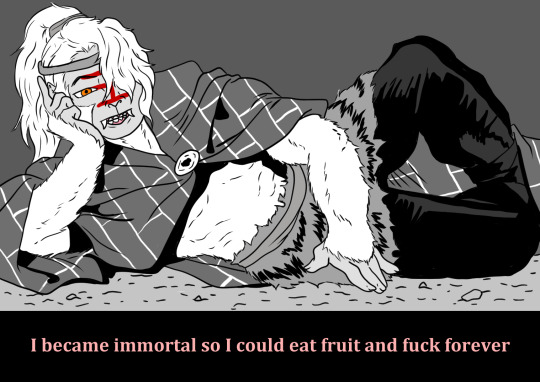
#zaju#sun wukong#sun xingzhe#journey to the west#jttw#xiyouji#kind of wild how much the figure of tang sanzang's monkey protector has changed over the centuries#but then again that is true with the figure of the monk himself#and again warning for the crudeness#because is SWK is completely uninterested in sex#SXG is like the exact opposite#homgmei sun even proposes that most of SXG's less virtuous traits were simply grafted onto Zhu Bajie in Wu Cheng'en's version aetewasf#anon answered
33 notes
·
View notes